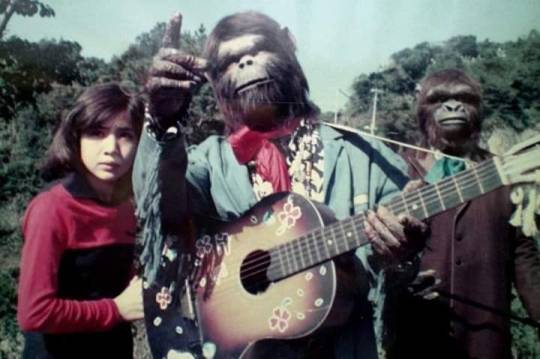#time of the apes
Explore tagged Tumblr posts
Text
50 years ago today, at least a few people were watching the premiere episode of Saru no Gundan, or Army of Apes – a 1974 Tsuburaya Productions tokusatsu television series you might know better as Sandy Frank’s Time of the Apes, most likely through its appearance on Mystery Science Theater 3000’s episode 306 (or K17). The full series was never officially released overseas, but an English subtitled version has been making the rounds, and as an avid fan of other tokusatsu such as the Gamera films even outside their Sandy Frank/MST3K context, I decided to check out the series a little over a month ago.
I will never look at Time of the Apes the same way again.
(AKA: “Why doesn’t Johnny care, and why should you?”)
The first five or so episodes are rough, with a repetitive cycle of our protagonists getting captured by Gebar and the ape army, escaping, and getting captured again. It almost makes one long for the cut-down and far quicker Time of the Apes pacing, although then we’d have to forfeit the wonderfully overdesigned arts-and-crafts snake made by Izumi, Yurika, and Jiro to frighten the ape guards. These are the episodes that represent the majority of footage used by Sandy Frank in the film version, ending at Godo, Jiro/Johnny, and Pepe’s escape via train and skipping over six full episodes before the next included scene.
That next scene in question is the infiltration sequence from episode 12 that reunites the whole cast again, concluding with a brief argument about what to do next. Izumi/Katherine’s insistence that the group remain with the Prime Minister/Commander is one of the only moments in Time of the Apes that suggests the human protagonists have any option in this new world other than to flee. It’s quickly dismissed, and we cut to an unrelated escape sequence taken from nine episodes later.
In Army of Apes, after a few intervening events, Izumi actually wins that argument, with Godo agreeing to put aside his hatred for the apes and accept the protection of the Prime Minister and the peaceful Gorilla faction. It’s only once they believe the Minister has been killed in an attack on his motorcade that the reunited cast is forced to go on the run again.
What happens in those missing six episodes, and what continues throughout those subsequent nine, is what’s truly at the heart of Army of Apes, especially when compared to the more straightforward Time of the Apes. In the 6-12 stretch, the main cast remains separated into two groups – Godo, Jiro, and Pepe are displaced by having taken multiple trains away from the army headquarters, meanwhile Izumi and Yurika travel alongside the Prime Minister and Deputy Director Sabo in an attempt to find them. The humans thus have plenty of time to interact with various apes out in the world during their adventures, these guest characters often providing the central storyline for the episode. After the midpoint of episode 13, the episodic structure is slightly lost as the overarching plot picks up (the cast catching wind of the mysterious UCOM and investigating the history of how humans were replaced by apes), but the encounters continue, all serving the series’ central question: “Can humans live in a land of apes?”
The stories in these episodes vary from familiar tropes to deeply bold statements, from bright and heartwarming to monumentally tragic. Beginning with episode 6 we have an ape father and son, who barely interact with the main cast but whose differing views on the subject of humans cause them both to be killed for standing in the way of Gebar’s vengeful pursuit of Godo. Episode 7 features the street musician Reed, an ape guitarist who bonds with Yurika over a love of music – together, they create the series’ second recurring lyrical theme, There’s Love Somewhere, which continues to be associated with Yurika and her friendships with ape characters throughout the show’s run. Later on, a blind ape woman mistakes Godo for her son Uri, who in reality died on his way home escaping a life of crime. The group saves a woman named Ura and are welcomed into her village. A member of the army must choose whether or not to help the humans after they save his young child. Mari, a nurse, hunts down the humans in revenge, believing them to have killed her secret agent husband, only to learn they tried to save him.
(You might have also heard there’s robots and ninjas in this show. That’s also true.)
The big game-changer moment for the series, though, is likely episode 9, in which a Baboon named Lag abducts Yurika with the intent to raise her as a future bride. The series pulls very few punches with just how dangerous and dark a situation it’s invoking – in fact, this is where the previously accommodating, but dismissive Prime Minister fully steps up into a protective role over Izumi and Yurika. There is, in particular, a moment where Lag makes Yurika perform her song for him, which feels deeply upsetting – a corruption of something that holds personal significance for her.
But while Lag is terrifying, we also see the side of him that’s more misguided than overtly malicious, framed somewhat as a victim of his own view of the world. Circumstances ultimately conspire such that Lag dies to protect Yurika, and I don’t consider this a redemption – Lag never confronts his actions, and acknowledging that Yurika is worth saving still isn’t the same as acknowledging that her worth includes the ability to make her own choices. But none of the characters involved, not even Yurika, view his death as anything but a tragedy. He gets a solemn burial, just like the other character deaths up to that point, and when Yurika performs her song for Ura’s village in a later episode, she dedicates it in part to Lag, choosing to mention him only as someone who saved her life.
This is another core theme in Army of Apes – that death is never a good thing, that all loss of life is tragic. It’s far from a completely pacifistic message – the fights against the army result in plenty of on-screen deaths that get little-to-no gravitas, and it’s not always explicitly self-defense either – but there’s a running trend of our main characters solving problems by reaching out through compassion whenever possible. Even the main title’s lyrics (to the best I can gather from an incomplete translation) remark that the right way to fight as a human is to “take up the weapon of love” – a sentiment all but directly stated at the end of episode 13, when Godo hurls a rifle away into the ocean and declares “we have stronger weapons.”
It's also invoked clearly in the Prime Minister’s speech as he awaits his execution, undercut only slightly by the fact he’s buying time for a rescue attempt. He asks to be brought water as a last request, but instead of drinking it, he uses it to water the flowers in his room, explaining that while he is to die, the flowers will live on into tomorrow. This is after every other leader of the Gorilla faction, including Deputy Sabo, has been executed by Luzer and the Chimpanzee uprising – in a story arc that predates Star Wars Episode III: Revenge of the Sith by 30 years, but these days, would never escape direct comparison to Order 66.
Sandy Frank, to circle back one last time, condensed the entire Chimpanzee uprising story arc into a single scene (with suspiciously exposition-rich background dialogue). After that, though, Time of the Apes presents the final two episodes of the series in relative completion. One of the scenes featured is the last conversation with the Prime Minister, where the humans reaffirm their insistence that they can’t live in an ape country.
In reality, there’s been quite the debate up to this point – and it’s additionally interesting and significant for a work in this genre that the entire concept of repopulating the human species, including any mention of romantic partners, is almost wholly absent from the series, and is never a concern of any of the human characters. The debate is always spoken of in terms of human connection, a sense of community and peace, and whether that’s possible between humans and apes. Godo’s hatred of apes due to the trauma of his family’s death is certainly a strong point of contention, but while Izumi laments the unfamiliarity of the new world, there’s a distinct sense that if she didn’t have Godo’s and the childrens’ needs to think of, she would have stopped trying to escape a long time ago. She and Yurika have formed an especially close bond with the Prime Minister, and Jiro, who eagerly insists “I don’t always cry,” discovers in the end that he has a strong attachment to Pepe, and is distraught when the two friends part ways for the last time.
(In other words… as it turns out, Johnny does care.)
Within the mountain, in a moment that’s particularly effective after having watched the full series as opposed to the film, the humans learn from E U C COM that they are truly the only four humans remaining in the world – the time-travelers having missed meeting anyone besides Godo by a margin of two years or less. It’s only then, when faced with an ultimatum of either being sent to another planet or further into Earth’s future, that the protagonists start to resist the idea of leaving, perhaps discovering only when it’s too late that they’d rather stay with the apes, after all.
Of course, the final turn tables back on E U C COM and it miscalculates – and no, the full context of the series does not add any realism to the pseudoscience/technobabble of why extremely cold temperatures turned the cryogenic preservation pods into actual backwards-operating time machines. Izumi, Jiro, and Yurika end up back in the present human world, and thus the series avoids giving a final answer to its central question.
In Time of the Apes, it probably doesn’t matter, as what we’re given is a fairly standard stock happy ending for the “well, that was a scary experience!” story Sandy Frank chose to tell.
But in Army of Apes, the answer is already pretty clear:
By this point, Godo and Jiro have promised to return and visit Uri’s mother someday. Ura’s village has welcomed the entire group, with a genuine invitation to stay and live there. Even the Prime Minister, who has lost all his closest associates, resigned his position, and resolved as a point of honor to exile himself from ape society (with his last act being to ensure the humans’ safety in his absence), seems to be setting himself up to live out the rest of his days in the company of the humans he’s grown so fond of, if only they’d stayed. We’ve seen humans and apes treat each other as if they’re one in the same, with often only Godo’s pain of the past and the others’ search for answers driving them to leave these opportunities behind. Gebar, now acting alone and outside the bounds of any military authority, is the last active ape threat to the humans, and once he learns the truth about his family and finally sets aside his grudge against Godo, there really is nothing to say that even if the time travelers were never able to return home, the series couldn’t have ended just as happily, or even more so.
Take up the weapon of love, fight like a human Army of apes, what are you doing?
#saru no gundan#army of apes#time of the apes#tokusatsu#mst3k#mystery science theater 3000#army of the apes
4 notes
·
View notes
Text
The Japanese Planet of the Apes TV series, Saru no Gundan (aka Army of the Apes) is on Youtube with English subtitles.
I've seen Time of the Apes, which is the edited down 90 minute version but until now I've never been able to find the whole series with subtitles.
Looking forward to watching this soon.
1 note
·
View note
Text

aren't you tired?
#isat spoilers#isat#in stars and time#isat fanart#isat siffrin#sif draws#digital art#colourpod#arent you tired. don't you wanna go ape shit /silly#the palette is literally a non-binary flag lmao#starlooping drawing tag#MIXED UP TAGS!!! EVIL AND FUCKED UP
2K notes
·
View notes
Text
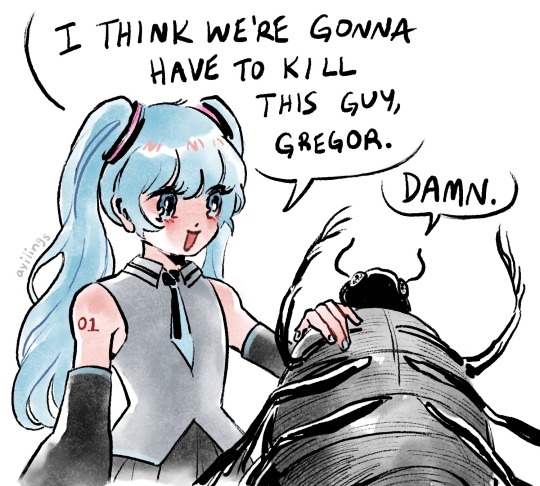
they get groceries and krill someone
based on this meme
#hatsune miku#vocaloid#the metamorphosis#vocaloid fanart#comic#i guess lol#eternal comfort character and high school ap literature comfort character except the real comfort character is absurdity#if u want a silly time look at the qrts of the tweet i shared theres good stuff happening over there#ayilings#2023#OH !!! the gregor here is a redraw of that one book illustration of him thats in all the memes just 2 b transparent
8K notes
·
View notes
Text

I love how the other primates have NO idea what our cameras are but if they see us staring into the mystery object they will come look too.
The even better part is they've done that since well before cameras had screens on them. Even when it was just a black box with a big glass eye on a tripod I'm pretty sure I remember apes and monkeys would come up behind people being filmed just to see what's up. Like oh is this what we're doing, are we praying to this big dead bug you carry around, alright
#also always cool every time that great apes recognize which humans are on their side#they really know not all of us are bad#probably because theyve got their own ape rivalries and ape enemies#they know how it is
777 notes
·
View notes
Text
random Gotham Goon #167 waking up in the hospital after trying to pull a move on the Bat because he’s “old” and “too tired” to “really fight back”:

#50 year old Bruce just rocking their shit#ten times worse than 35 year old Bruce#Gotham#bruce wayne#batman#dc#yes I’m rewatching AP bio lol
830 notes
·
View notes
Text
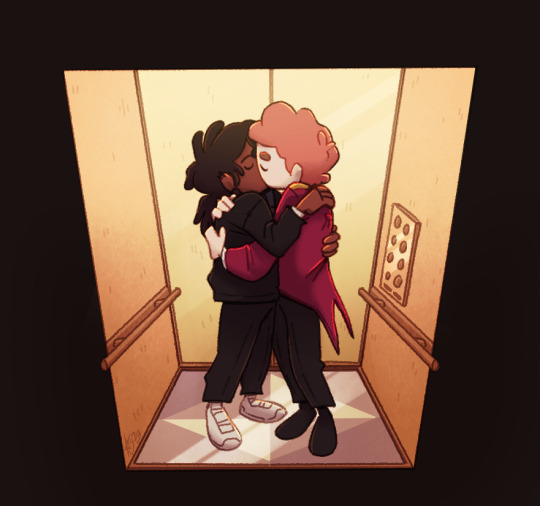
Mwah
Something something every universe
#the name of this drawing in procreate was Going Down… On You Loll#I’m an insane person I’m tearing at the walls making ape noises#those guys were going CRAZY in that elevator like they went in with the open mouth sheeeeesh wait till you get in the car at least#joke joke joke#unless#adventure time#adventure time fanart#fionna and cake#gumlee#gary prince#prince gumball#Marshall lee#bubbline#artists on tumblr#my art
6K notes
·
View notes
Text
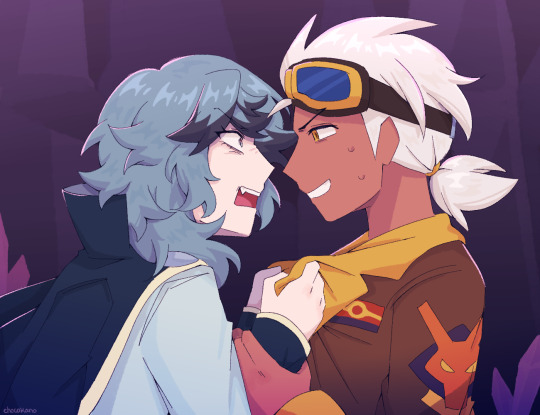
ep 86 still has me in a chokehold i fear
#pokemon horizons#pokeani#anipoke#pokemon hz#spinel pokemon#pokemon spinel#pokemon friede#friede pokemon#friespinel#amethiosanguishshipping#my art#i started this like. right after the ep but then i got sick and then i had the sat and then the WORST apes test of my life#but ykw its fine we ball! even if its a week late#big fan of when spinel just Loses It#especially this time oh my god#it was HYSTERICAL. sorry man the guy you thought was all analytical like you was actually just winging it the whole time#my condolences. kidding i hope things go worse for him
318 notes
·
View notes
Text
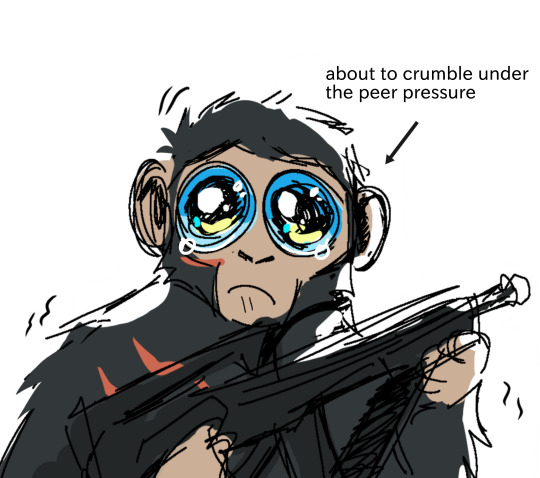
so i rewatched the trilogy recently and i am shaking why does blue eyes look like this the entire movie
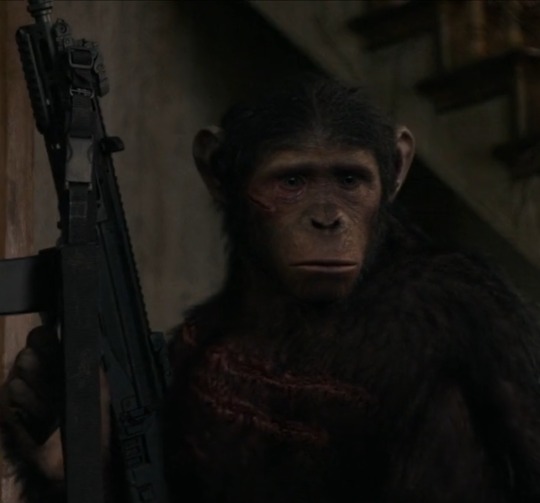

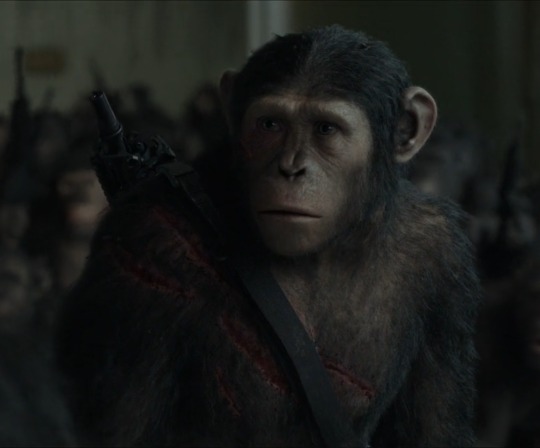

are you Okay
#he looks like a kicked puppy why give him a gun#dawn of the planet of the apes#pota#doodle#free time well spent 🙏 i think!
1K notes
·
View notes
Text
Obsessed with Nightmare Time episodes that are like “Really? You thought this was a character who just so happened to be played by Joey Richter? ✖️WRONG✖️ it's Theodore Spankoffski.”
#its like the equivalent of dw fans thinking everyones the master#sidenote- if mrs flood ends up being the master im gonna be so pissed#anyway back to the fandom this post is about#starkid#hatchetfield#team starkid#starkid productions#ted spankoffski#nightmare time#the hatchetfield ape man#time bastard#joey richter
587 notes
·
View notes
Text


Good Gorgug Hunting
#more colored sketches while i procrastinate my thesis#i cant stress enough how much i love the school scenes this season#theyre so deeply chaotic oh my god#Gorgug giving me flashbacks to taking 1 million ap classes oughhh#he can do it though hes the greatest barbarian wizard artificer of our time#d20#dimension 20 fhjy#fantasy high junior year#gorgug thistlespring#fanart#spoilers#but out of context so not rlly
1K notes
·
View notes
Text

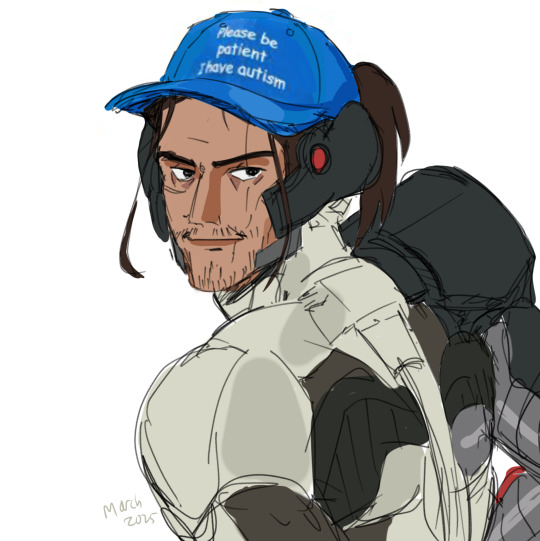

good morning. stupid images I drew this week
#solius art#samuraiden#jetstream Sam#raiden mgr#metal gear rising revengeance#one day I’ll get through them all#every time I knock another one out of my drawing ap#like 2 more appear#my mind never shuts off it’s terrible
252 notes
·
View notes
Text

I've been playing a lot of Stardew Valley lately and to no one's surprise I love the feral parrot child sm
#stardew valley#emily sdv#leo sdv#sdv fanart#my art#digital art#I know he becomes like besties with Linus but I think an interaction between these two would be so wholesome#me seeing Leo for the first time: that's my son. son boy acquired.#please concerned ape let me adopt him
582 notes
·
View notes
Text
Tired of pretending they don’t want each other carnally

#I’ll finish this tmr but for now#sleepy time (I have a AP world test tmr and I’m cooked☺️)#cotl#cotl fanart#cult of the lamb#cotl lamb#cotl lambert#cotl narinder#cult of the lamb lambert#cotl narilamb#cult of the lamb narinder#narinder fanart#narilamb doodles#narilamb fanart#narilamb#colt narinder#follower narinder#narinder x lamb#the lamb cotl#lamb x narinder#RRAAHH
829 notes
·
View notes

